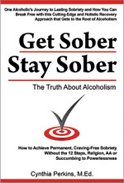Understanding Alcohol Addiction
In order to recover from alcoholism it is crucial to understand the process of alcohol addiction. For successful sobriety, you need to know what you're dealing with and how to address it effectively. When you get to the root of the problem, then you have the knowledge you need to end your addictions for good.
Science tells us that alcoholism it is not a psychological disorder, a spiritual illness, weak will or character defects. Although alcohol addiction affects all areas of your life and is experienced physically in many parts of the body, addiction begins in the brain. Alcoholism is a brain disorder.
The reward pathway, also known as the mesolimbic pathway or the pleasure pathway, resides in the center of the brain and is what drives our feelings of motivation, reward and behavior. Its primary job is to make us feel good or “reward” us when we engage in behavior that is necessary for survival, such as eating, drinking water, being nurtured and procreating.
It’s also responsible for making sure that we repeat these behaviors over and over to ensure survival of the species. It achieves this goal by giving us feelings of pleasure when we engage in these behaviors. In other words, it reinforces behavior by giving us pleasurable rewards.
This pleasure is given by releasing neurotransmitters. Neurotransmitters are chemical messengers in the brain that make communication between nerve cells possible. The critical neurotransmitter involved in the reward pathway is dopamine. However, there are two other crucial brain pathways that make use of dopamine—the nigrostriatal pathway and the tuberoinfundibular pathway. It is these two pathways together with the reward pathway that make up the dopamine pathway. Therefore, any drug that impacts the reward pathway also impacts these other dopamine pathways as well.
All drugs, and remember alcohol is a drug, stimulate the dopamine pathway -- reward pathway. Some drugs work by stimulating the release of excess dopamine, while others block receptor sites; however, the end result is that the brain is flooded with high levels of dopamine. They also impact the serotonin pathway and other crucial neurotransmitters like GABA, glutamate, acetylcholine, and endorphins, but we’ll be focusing mostly on dopamine.
GABA is our main inhibitory neurotransmitter. It works as a natural tranquilizer, stops us from being impulsive and prevents over stimulation and also plays a major role in alcohol addiction. Glutamate is important because it’s needed for most of the neurotransmission that takes place. People with imbalanced levels of GABA and glutamate have problems with impulse control, anxiety, nervousness, restlessness, obsessive tendencies, and irritability to name only a few.
Serotonin plays a major role in mood, sleep, appetite, pain and regulating body temperature. It also contributes to good feelings of well-being and produces intense euphoria when overstimulated. People with anxiety disorders, obsessive-compulsive disorder, and depression often have a problem in their serotonin and dopamine pathways. Both dopamine and serotonin are sometimes referred to as our “happy hormones.” Without them we feel empty and depressed, flat and lifeless.
Endorphins are the bodies built in natural pain reliever. They regulate emotional and physical pain and also influence mood, self-esteem, relaxation, and feelings of well-being and empowerment.
Dopamine gives us pleasurable feelings. It makes us feel good, confident, relaxed, and instills a heightened sense of overall well-being. It improves mood, alertness and libido. When it's overstimulated it produces intense euphoria.
Reward Pathway and Alcohol Addiction
Here's an example of how the reward pathway works: You're hungry and you see a big plate of spaghetti in front you. Your five senses gather information about what you see and send a signal to your brain. Your area of the brain that controls memory tells you that if you eat this plate of spaghetti, it will make you feel good, so it tells you to pick up the fork and eat it.
When you eat it, your five senses tell the brain you're eating something good and that your stomach is getting full. At this point the brain releases the neurotransmitter dopamine from the reward pathway, which gives you a little surge of pleasure. This is your reward for eating the spaghetti.
The reward pathway then connects with other areas of your brain that control memory and behavior and tells it to remember that eating spaghetti makes you feel good. This reinforces that you will repeat this behavior again, to receive the reward and feel the good feelings.
Here's what happens in the reward pathway when you ingest alcohol or drugs: They bypass the five senses and within seconds go directly to the brain’s reward pathway. Instead of just a little surge of pleasure, they stimulate the release of excessively high levels of neurotransmitters, which results in an immediate surge of extremely intense pleasure. The amount of dopamine released by drugs of abuse can be two to ten times higher than the amount released by natural means, such as food, and the effects usually last much longer, which is the primary factor in alcohol addiction.
This is what is commonly called the "high." The reward pathway connects with other parts of the brain and tells it to remember that drugs and alcohol create this incredibly good feeling and this is an extremely powerful reinforcement that you'll repeat again so you'll continue to have the pleasurable experience.
The impact of the excessively high levels of dopamine on the brain is so powerful that the brain must find a way to adapt to these powerful surges. One of the ways that it does so is by desensitizing itself or reducing the number of dopamine receptors at the synapse and reducing the amount of dopamine it releases. This results in what we call "tolerance." Once the feelings of pleasure have dissipated, it will now require more of the drug to achieve the same results. The more often you use the drug, the more sensitized your receptors become and the more drugs you require to get high. Alcohol addiction is developing.
With repeated use of a drug, the neurons, which are where the neurotransmitters like dopamine reside, in the brain become dependent upon the drug -— they can no longer function normally without it. The brain no longer produces or releases the essential neurotransmitters that allow us to feel pleasure on its own. When this happens, the user feels depressed and unable to experience pleasure in activities that used to be enjoyable to them and they experience withdrawal symptoms when the drug is not in their system and, thus, they will use again in order to feel better. They now need and crave the drug of abuse to simply bring their dopamine levels back to normal.
Over time, as the brain is forced to continue to adapt to alcohol or drugs, the other areas of the brain outside the reward pathway become affected. The circuitry of the brain that is responsible for memory, learning and judgment becomes hardwired to perform addictive behavior almost innately. It disrupts crucial brain structures that are critical for controlling behavior, especially behaviors related specifically to alcohol or drugs. It erodes one’s ability to display self-control and make good decisions. Thus, the drug user is now a drug addict. In the case of alcoholism, alcohol addiction is now full blown.
The faster a substance reaches the brain’s reward pathway, the more addiction potential it holds. The quickest route to deliver a drug to the brain is through smoking it and, thus, why substances like crack cocaine and cigarettes are so highly addictive. The second fastest route is through injection, while the third quickest is snorting or sniffing and the least quick is ingestion.
This is why many people advance from one addiction to another. They start out with sugar, caffeine or cigarettes. As the brain adapts and needs more and more to get the same feeling, sugar no longer does the trick, so they move on to cigarettes, after a while cigarettes no longer provides the same relief, so they move on to alcohol. After a while alcohol no longer does the trick and they move on to cocaine and so on and so on.
Although we're talking about alcohol addiction on this page, the process of addiction I've described applies to any addiction regardless of the substance or activity. They flood the brain with neurotransmitters that makes us feel good. Over time this destroys the neurons, then the brain doesn't produce neurotransmitters adequately anymore, the brain needs more and more to function normally.
Anything that activates the reward system can become addictive, particularly in brains that are already vulnerable. This includes nicotine, caffeine, sugar, alcohol, carbs, psychotropic drugs, and even behaviors like shopping, gaming, gambling, social media, sex, and pornography. The more "over" activation that it incites in the reward pathway, the more addictive it becomes.
This process is also true of serotonin, GABA and endorphins. Alcohol also stimulates a large surge in these neurotransmitters, which leads to depletion and dependence on alcohol to function adequately. Thus resulting in cravings to bring them back to normal and alleviate symptoms like anxiety, depression and irritability.
Additionally, alcohol and other psychotropic substances can mimic our natural neurotransmitters like GABA, serotonin, dopamine, and endorphins, meaning they can occupy the receptors, which also tricks the brain into thinking it has too many and thus it quits producing them. This leaves the brain dependent upon the alcohol or other addictive substances to perform the duties of the impaired neurotransmitter.
Some drugs may inhibit the reuptake process, which prevents the neurotransmitter from being broken down, and thus floods the brain with higher than normal levels.
So, psychotropic substances can affect neurotransmitters in numerous ways. They can activate neurons because they mimic the chemical structure of the neurotransmitter, or they can stimulate the release of higher than normal amounts of the neurotransmitter, or they can prevent the uptake process of a neurotransmitter, which prevents it from being broken and leads to a higher level than normal. But, the end result is the same, in that their is surge in these neurotransmitters, which then leads to downregulation of production of or responsiveness to the natural neurotransmitter.
It’s also important to note, that the fact that neurotransmitters and the reward pathway are at the root of alcohol addiction, and addiction in general, is not my opinion or a theory or concept that I created. It is what science has found to be true and even NIDA, the National Institute on Drug Abuse, is teaching this basic concept. I encourage you to visit the following sites and learn more about the science of alcohol addiction.
http://www.drugabuse.gov/scienceofaddiction/brain.html
http://learn.genetics.utah.edu/content/addiction/drugs/
http://www.nida.nih.gov/DrugPages/addiction.html
http://www.drugabuse.gov/scienceofaddiction/addiction.html
The difference between NIDA and many of us in the natural health field is that they fail to understand that alcohol addiction can be addressed successfully with diet, nutrition and lifestyle changes, as I have outlined on the pages of this site.
Criteria for Alcohol Addiction
There are four important criteria that define an addiction.
- Psychological – The addicted person uses the substance or activity compulsively regardless of the negative impact it has on their health or life.
- Physiological – The substance or activity overstimulates neurotransmitters and the reward pathway in the brain. The intense euphoric feelings that are experienced cause the person to repeat the behavior over and over again to keep experiencing the feelings.
- Tolerance – As the brain adapts to excess stimulation of neurotransmitters and the reward pathway, it needs more and more of the substance or activity to achieve the same results.
- Dependence – Over time the addicted person’s brain, neurotransmitters and reward pathway can't function normally without the substance.
Why are Some People More Vulnerable to Addiction than Others?
Although alcohol addiction begins in the brain, there are many factors that may contribute to setting this monster into action.
It is all about neurotransmitters. People who are vulnerable to addiction typically already have some type of disruption or depletion in their neurotransmitters. Their neurotransmitters were depleted or not functioning properly, sometimes at birth, or at some point in their life a trigger sets them off balance.
Neurotransmitters may be damaged, depleted or imbalanced by a large variety of factors, which include the following:
- childhood abuse
- sugar
- caffeine
- nicotine
- food allergies or food sensitivities
- environmental toxins
- heavy metal toxicity
- hypothyroidism
- chronic or excessive stress
- hypoglycemia
- candida overgrowth
- nutritional deficiencies
- a high carbohydrate diet
- genetics
- bacterial overgrowth
- drugs and alcohol
- brain injury (like a concussion)
Some people are born with a genetic polymorphism in enzymes that are essential to synthesize dopamine and serotonin, thus they are simply not capable of making them. There are can also be genetic problems in breaking them down.
In order to overcome alcohol addiction, each of these factors must be addressed. Some people may be born with nutritional deficiencies or a biochemical imbalance in the neurotransmitters and are an addict waiting to happen, while for others neurotransmitters may become depleted later or imbalance through child abuse, a poor diet high in sugar or any of the factors mentioned above and addiction is then set into motion.
Addiction develops in a misguided attempt to balance out neurotransmitters. We turn to drugs and alcohol because they give us a boost in the neurotransmitters. Drugs and alcohol provide a temporary fix -- the make us feel better briefly -- but ultimately they damage the neurotransmitters even more and much more severely. The longer you continue to use drugs and alcohol, the more damage that is done. The more damage that is done, the more symptoms and misery that build and more relief is needed. Thus the vicious cycle is set into motion.
After extended alcohol or drug usage, the neurotransmitters have been damaged extensively and the brain no longer functions adequately. When you give up the drugs and alcohol, not only do the excessive levels of neurotransmitters disappear, but now you actually have less than you did before. The brain no longer releases enough of them to perform its job and remember the neurotransmitters have the job of making you feel good, regulating your mood states, pain and stress. Without adequate neurotransmitters you don't feel normal, pleasure, relaxed, or happy.
To stop this roller coaster ride, all behaviors that affect the neurotransmitters negatively must be eliminated. Excessive stimulation of the reward pathway in the brain must stop. The brain must become accustomed to normal levels again, so receptor sites can normalize. So that means you can't ingest or consume any substance that excessively stimulate neurotransmitters and the reward pathway.
It takes time for the neurotransmitters to adjust and balance out. If you continue to eat sugar and other refined foods, consume caffeine, smoke nicotine and be exposed to high levels of environmental toxins your neurotransmitters can never recover and normalize. These substances continue to provide excessive stimulation to neurotransmitters and the reward pathway and perpetuate the physiological process of alcohol addiction.
This is why traditional treatment with a 12-step program is so ineffective and so many people relapse and continue to experience cravings, because the root of alcohol addiction is not addressed. As long as these issues are unresolved, the neurotransmitters continue to be on a roller coaster ride. Cravings for alcohol or drugs will continue as long as the neurotransmitters are continually stimulated excessively and out of balance.
The goal in recovering from alcohol addiction, or any addiction for that matter, is to restore balance to the neurotransmitters. The most crucial step in recovering from any addiction is to stop stimulating the reward pathway in the brain with artificial sources that cause it to release excessive levels of neurotransmitters so that the brain can recover and restore natural order. As long as the reward pathway and other neurotransmitters are excessively stimulated, then cravings for drugs and alcohol will occur and relapse is pretty much imminent. When you stop artificially stimulating the reward pathway and allow your neurotransmitters to stabilize, cravings for alcohol and/or drugs simply disappear. When cravings disappear, then staying sober is no longer a struggle.
The second step is to replenish the neurotransmitters with proper diet, nutritional supplementation, managing your stress, and healthy activities like exercise, mindfulness-based meditation, deep breathing exercises or other activities that stimulate neurotransmitters in a healthy and balanced manner.
If you'd like a more comprehensive understanding of this approach and how I used it to achieve more than 30 years of uninterrupted and craving-free sobriety, you can find step-by-step instructions for balancing your neurotransmitters and achieving life-long and craving-free sobriety, in my Clean and Sober for Life Jump-Start Program.
If that's too much for your pocketbook, you might want to take a look at my book, Get Sober Stay Sober: The Truth About Alcoholism.
Alternatively, if you need a more personal approach for alcohol addiction, you may want to talk with me one-on-one through my sobriety coaching service.
Here's a very important point to keep in mind. The longer you engage in alcohol addiction or your drug of choice, the more damage you do to the neurotransmitters. The harder your drug of choice, the more damage you will do to the neurotransmitters. So recovery for someone who has used softer drugs will have an easier road to recovery than someone who used hard drugs, someone who has drank or used for a shorter period of time will have an easier recovery path than someone who has been at it for decades. Additionally, someone who doesn't have child abuse or neglect in their past may have an easier time in recovery than someone who does, because their neurotransmitters have been damaged since they were a child. So the sooner you begin the recovery process the better off you are in the long run.


